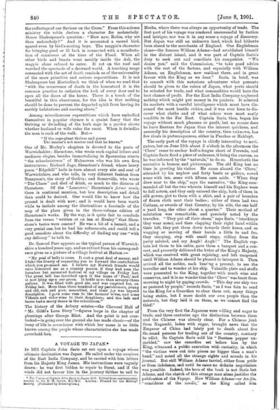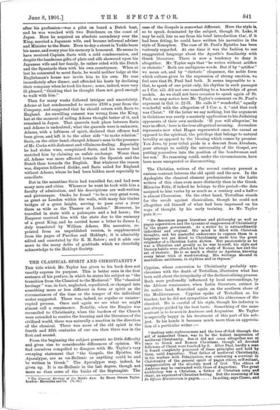A VOYAGE TO JAPAN.* IN 1611 Captain John Saris set
out upon a voyage whose ultimate destination was Japan. He sailed under the auspices of the East India Company, and he carried with him letters from his Majesty King James. His instructions were vaguely drawn : he was first bidden to repair to Surat, and if the winds did not favour him in the journey thither to sail to
• The Voyage of Captain John Saris to J'apan,1813. Edited from contemporary records by Sir E. M. Satow, E.C.M.G. London Printed for the 0' luyt Society. LPublished by Subscription.] Mocha, where there was always an opportunity of trade. The first part of his voyage was rendered unsuccessful by faction and intrigue, nor was it in any sense a voyage of discovery. But Japan was still an unknown land, which had hitherto been closed to the merchants of England. One Englishman alone—the famous William Adams—had established himself in the distant island, and it was part of Captain Saris's duty to seek out and conciliate his compatriot. "We desire you," said the Commission, "to take good advice with the rest of the factors, and especially with William Adams, an Englishman, now resident there, and in great favour with the King as we hear." Saris, in brief, was to consult with this notorious adventurer what presents should be given to the rulers of Japan, what ports should be selected for trade, and what commodities would have the best chance of profit. For the East India Company neglected nothing which might put money in its pockets. It selected its markets with a careful intelligence which must have dis- armed the most hostile critics, and it was ever keen to dis- cover what cloths and of what colour were most easily vendible in the Far East. Captain Saris, then, began his voyage without much pleasure or profit, but no sooner does he leave Bantam for Japan than the interest quickens, and assuredly his description of the country, then unknown, has few rivals in picturesqueness, either in Parches or Hakluyt.
The early part of the voyage is chiefly interesting to nevi. gators, but on June 11th about 3 o'clock in the afternoon the 'Clove' came to anchor half-a-league short of Ferando, and Captain Saris fired a piece of ordnance, it being the custom, as he was informed by the "naturals," to do so. Henceforth the narrative is human and picturesque. The old King lost no time in greeting his visitor. He came aboard the 'Clove,' attended by his nephew and forty boats or galleys, rowed some with ten, some with fifteen oars aside. "When they . drew near to the ship," says the narrative, "the King com- manded all but the two wherein himself and his Nephew were to fall astern, and they only entered the ship, both of them in silk gowns, girt to them with a skirt, and a pair of breeches of flaxen cloth next their bodies ; either of them had two Cattans, or swords of that Country, by his side, the one half a yard long, the other about a quarter." Their method of salutation was remarkable, and precisely noted by the traveller. "They put off their shoes," says Saris, "(stockings they wear none), and then clapping their right hand within their left, they put them down towards their knees, and so wagging or moving of their hands a little to and fro, they stooping, step with small steps, sidling from the party saluted, and cry Augh ! Augh ! " The English cap- tain led them to his cabin, gave them a banquet and a con- cert, and presently delivered the letter of the King's Majesty, which was received with great rejoicing, and left unopened until William Adams should be pleased to interpret it. Then arrived all the nobles, each bearng a present, to see the traveller and to wonder at his ship. Valuable plate and stuffs were presented to the King, together with much wine and conserves, and it is no wonder that the 'Clove' was beset from morning to night by gaping crowds. "This day our ship was so pestered by people," records Saris, "as I was fain to send to the King for a Guardian to clear them out, many things being stolen, but I more doubt our own people than the naturals, but they laid it on them, so we cannot find the thief."
From the very first the Japanese were willing and eager to trade, and three centuries ago the distinction between them
and the Chinese was already clear. For a Chinese junk from Nagasaki, laden with sugar, brought news that the Emperor of China had lately put to death about five thcusand persons for trading out of the country, contrary to edict. So Captain Saris sold his "Bantam pepper un- garbled," saw the comedies set before him by the King, witnessed a public execution with curiosity, in which "the victims were cut into pieces no bigger than a man's hand," and noted all the strange sights and sounds in his journal. But still William Adams tarried, either from pride or from indolence, and until he came no definite negotiation was possible. Indeed, the hero of the book is not Saris but Adams, and the sketch of this strange man alone justifies the publication of the Voyage. Now William Adams—or
" considerer of the needle," as the King called him
after his profession—was a pilot on board a Dutch boat, and he was wrecked with two Dutchmen on the coast of Japan. Here he acquired an absolute ascendency over the King, married a Japanese wife, and became informal adviser and Minister to the State. Even to-day a street in Yeddo bears his name, and every year his memory is honoured. He seems to have received Captain Saris with a cold condescension, and despite the handsome gifts of plate and silk showered upon his Japanese wife and her family, he rather aided with the Dutch and the Spaniards than with his own countrymen. When at last he consented to meet Saris, he would neither lodge at the Englishman's house nor invite him to his own. He rose immediately after dinner, and offended his hosts by declining their company when he took his leave; some, indeed, were very ill pleased, "thinking that he thought them not good enough to walk with him."
Then for many weeks followed intrigue and uncertainty. Adams at last condescended to receive 2100 a year from the Company, and suggested that he should return with Saris to England. An unwilling consent was wrung from the King, but at the moment of sailing Adams thought better of it, and remained in Japan. That quarrels took place between Saris and Adams is undoubted; what the quarrels were is unknown. Adams, with a loftiness of spirit, declared that offence had been given, and left it to the other side "to make relation." Saris, on the other hand, charged Adams's man in the presence of Mr. Cocks with dishonest and villainous dealing. Especially he had stolen wine, complained Saris, and his master had matched him by claiming an unfair exchange. Worse than all, Adams was more affected towards the Spanish and the Dutch than towards the English. But whatever the reason was, disputes followed dislike, and Saris sailed for England without Adams, whom he had been bidden most especially to conciliate.
But in the meantime Saris had travelled far, and had seen many men and cities. Wherever he went he took with him a faculty of admiration, and his descriptions are well-written and picturesque. Osaka he found "to be a very great town, as great as London within the walls, with many fair timber bridges of a great height, serving to pass over a river there as wide as the Thames at London." Moreover, be travelled in state with a palanquin and a led horse ; the Emperor received him with the state due to the emissary of a great King, and he carried home a letter to James L, duly translated by William Adams. His narrative, re- printed from an unpublished version, is supplemented from the pages of Purchas and Hakluyt ; it is admirably edited and annotated by Sir E. M. Satow ; and it adds one more to the many debts of gratitude which we cheerfully acknowledge to the Hakluyt Society.







































 Previous page
Previous page